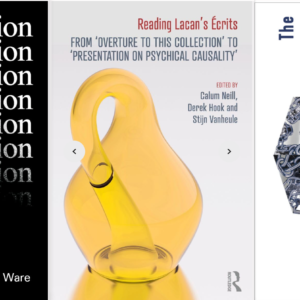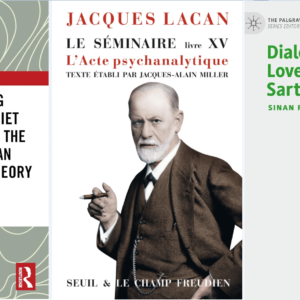News – December 2013
Publications
Heralding the WAP (World Association of Psychoanalysis) Congress in Paris in April this year, December saw the publication of Editions 9 and 10 of What’s Up, the WAP’s regular newsletter. They can be found on the Congress’s site here and include a number of orientation texts that make for preparatory reading ahead of the Congress. All focus on the Real in the 21st Century, the topic of the Congress itself. Number 9 includes Marco Focchi’s ‘The real cause is the non-necessary cause’, an interesting meditation on the exteriority of the real as cause for both Freud and Hume, and the difference between an exterior notion of causality on one hand and Freud’s Nachträglichkeit (translated variously as ‘deferred action’ in the Standard Edition, as apres-coup by Lacan, and ‘afterwardness’ by Laplanche) on the other. With a deadline of Sunday 5th January, it’s also the last chance to submit papers for the Congress.
The Action Committee of the School One, which is helping to organise the Congress, also publishes a regular selection of papers leading up to the event. The first four (numbers 0-3) are available in English on the Congress’s site. No. 5 was released in December but at present is currently only available in Spanish.
The publication of Lacanian Ink 43, the journal from Lacan.com, is now scheduled for early 2014. It is provisionally titled ‘Nerve-annexation’ (a translation of the German term Nervenanhang with which Schreber uses to describe his delusion in his Memoirs which so fascinated Freud and later Lacan). Many of the articles focus on the topic of the real which, as we have seen from the subjects of the upcoming NLS and WAP congresses, is much in vogue in Lacanian circles at present. More of the provisional details of the new edition can be found on http://lacanianink.tumblr.com. Volunteer translators from French and Spanish are also requested for the latest edition. If you are able to help email perfume@lacan.com.
Issue 9 of the journal of the SITE for Contemporary Psychoanalysis went up on the group’s site in December. It is the first to be published digitally and focuses on the subject of trauma. It contains a number of papers written from a Lacanian perspective. Philip Hill’s on trauma, immunology and allergy, and Barry Watt’s on Freud and Aristotle’s lessons for tragedy and trauma, are of particular interest.
The latest issue of the journal of the Centre for Freudian Analysis and Research in London – JCFAR – was also published in December. It is available to buy via Karnac Books now and will shortly be available to download on the JCFAR site at a discounted price.
From Melbourne, psychoanalyst David Ferraro’s paper ‘Psychoanalysis and the DSM – a brief discussion and critique’, presented at a meeting of the Lacan Circle of Melbourne in July, went up on his site last month. It is well worth checking out as Ferraro writes very eloquently, and in this article provides an excellent background to the history of the DSM and its development since the early 1950s.
Following the passing of Nelson Mandela there was a piece by Claire Zebrowski in Lacan Quotidien on 8th December which is well worth reading. Zebrowski alighted on a quote from Lacan in Seminar I where he tells his audience that at the junction of the symbolic and imaginary is love; at the junction of the imaginary and the real is hate; and at the junction of the real and the symbolic, ignorance (Seminar I, p.271). Zebrowski tries to locate apartheid and Mandela himself on this triangle, arguing that apartheid existed at the junction between the imaginary and the real (where Lacan positions hate), supported by discrimination that existed at the junction of the real and the symbolic (where Lacan positions ignorance). Mandela, she argues, positioned himself between the imaginary and the symbolic (where Lacan situates love). He also succeeded in unifying his country’s people around a signifier that was not-all, and in showing that the ‘white’ man and the ‘black’ man do not exist as such, echoed Lacan’s maxim from Seminar XX that ‘The Woman’ is not-all and does not exist, barring the ‘The’ of ‘The Woman’. The article, in French, is available here.
Incidentally, the image that accompanies this post is of Mandela meeting British Prime Minister David Cameron and his wife Samantha. In an article from November we looked at the ways in which Lacan used the disruption of the imaginary register as a motor in his clinical practice, and outside it, and encouraged his students to do likewise. The expert camouflaging that Mandela exhibits in this amusing photo demonstrates quite nicely that he, too, got this lesson.
Events
Details were published in December of the upcoming Clinical Study Days organised by Lacanian Compass which take place in New York in February. Firstly, on 14th February is a lecture by Miquel Bassols, the incoming President of the World Association of Psychoanalysis. Bassols’ free talk will be on the subject ‘Psychoanalysis, Science and the Real’. More details are available on the flyer here. Bassols’ lecture precedes the Clinical Study Days themselves on the weekend of 15th-16th February looking at ‘The Paradoxes of Transference’. Full details of those are on the event’s site at http://www.clinicalstudydays.us. A call for papers for the event is still out until January 15th thanks to an extended deadline.
The Swiss society of the NLS, ASREEP has announced a number of seminars in Geneva throughtout 2014 that will focus on ‘The pass and the variety of its instances’ (La passe et la variété de ses moments), with analysts from around the world and members of the cartel on the pass giving their views on this controversial subject. Proposed by Lacan in 1967, the pass was envisaged by him as an ‘event’ that marked the end of an analysis, a way to realise the passage of the analysand to the position of analyst. Lacan saw this as a suitable alternative to a qualification or diploma and as a way of conferring the title of analyst, because through the pass the analysand would be able to give an account of the singularity of his or her experience in analysis. The pass, in his view, would give them a way to convert the experience of a series of analytic sessions – perhaps over many years – into a coherent whole. Nevertheless, since its initial proposal by Lacan many have been wary of what the pass looks like in practice, and as such not all Lacanian groups practice it. Full details of the schedule for the series (in French) are on ASREEP’s site here.
Two new events from the London Society of the NLS are coming up early this year in the group’s ‘Knottings Seminar’ series, which is preparatory for the NLS Congress in Ghent in May. Like the Congress, the events will focus on the theme ‘What Cannot Be Said: Desire, Fantasy, Real’. The first event will be on 11th January and include five speakers from different NLS groups (Belgium, Israel, Russia and the UK). The second will be with Jean-Louis Gault, ECF analyst from Paris, on 15th February. Full details are on the NLS site here.
Recent seminars by the Irish Circle of the NLS received a write-up last month. A report by Claire Hawkes on the group’s recent seminar with Pierre-Gilles Guéguen on ‘The Status of the Fantasy from Seminar VI to Seminar XXIII’ is here. Further down that page is the report from Tom Ryan, also published in December, on the ICLO-NLS’s open seminar on the theme ‘Mother… Mother… Mothers’, presented as a dialogue between literature and psychoanalysis. The many speakers in the latter included writer and broadcaster Niall McMonagle, Alan Rowan, Claire Hawkes, Linda Clarke, Florencia Shanahan and Joanne Conway.
Finally, a reminder that the Jacques Lacan Workshop organised by Josefina Ayerza of Lacan.com will be recommencing sessions in New York City on 7th January. It is free and open to all. See www.lacan.com for more details.
Other News
Slavoj Zizek’s latest documentary The Pervert’s Guide to Ideology is now available to buy on DVD in the UK following its cinema release in September. As previously reported, despite the weariness of some Lacanians about Zizek’s more recent work, the film is well worth watching and contains some interesting Lacanian insights. It has a US DVD release in February.
Thanks to Evan Maleter and Lacanian Foothold for pointing out that the site Monoskop.org has a large number of books downloadable for free, with an extensive psychoanalysis selection. Amongst the gems therein are Lou Andreas Salomé’s Freud Journals, the writings of Victor Tausk, Henry Bond’s fantastic ‘Lacan at the Scene’ (although the image quality in the latter is impaired in the downloadable version), works by Badiou, and of course a copy of Lacan’s Écrits.
Got news? Get in touch.




Thanks for the link!
Pleasure, David. Enjoyed your paper very much. Owen